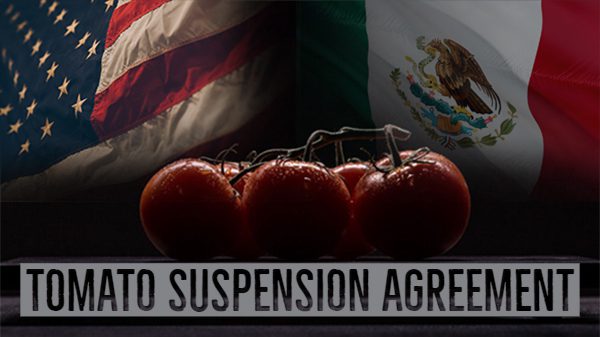Tucson, AZ (September 28, 2023) – American consumers could soon be paying approximately 50% more for retail tomatoes, according to a new economic analysis of proposed punitive duties on fresh tomatoes from Mexico currently under consideration by the U.S. Department of Commerce.
The study out of Arizona State University shows that this action — which would be triggered by the proposed termination of a key trade agreement — would have dire economic consequences for American consumers and businesses alike, particularly in Arizona.
In June, the Florida Tomato Exchange (FTE) requested that the Department of Commerce terminate the 2019 Tomato Suspension Agreement (TSA), which sets an agreed-upon reference price for the sale of fresh tomatoes from Mexico in the U.S. market.
The termination of the agreement would dramatically restrict the supply of tomatoes, thereby reducing competition on grocery store shelves, raising prices for consumers at the check-out counter, and boosting the profits of a small handful of wealthy Florida tomato-growing conglomerates.
Led by Dr. Timothy J. Richards, Morrison Chair of Agribusiness at Arizona State University, the analysis evaluated the impact that terminating the TSA will have on consumer prices, retail sales, and economic activity in two states that are central to the tomato supply chain in the U.S., Arizona and Texas.
Key results of the ASU study (which can be seen in full here) include:
• If the TSA is terminated and import tariffs are imposed on Mexican tomatoes, U.S. consumers can expect to see tomato prices increase by an average of 52.0% across all affected varieties of tomatoes (including cherry, grape, greenhouse, roma, TOV and vineripe.)
• U.S. grocery retailers alone will see a $7.53 billion decrease in revenue as a result of termination of the agreement.
• In Arizona, economic activity will fall by almost $3.40 billion across sectors, with potential loss of more than 22,700 jobs.
• In Texas, economic activity will fall by over $4.53 billion across sectors, with a potential loss of more than 32,000 jobs.
In short, the study confirms what more than 400 businesses across 32 states told Commerce in a filing this week: the impact of tomatoes imported from Mexico generates economic value far beyond their retail value, and supports jobs, businesses, and tax revenue in local communities throughout the U.S.
“The data is clear. If the Administration opts to terminate this agreement, it will cause significant economic damage to countless communities in Arizona, Texas and beyond, while also sending tomato prices skyrocketing for consumers across the country at a time when many American families are already struggling with the rising cost of living,” said Lance Jungmeyer, President of the Fresh Produce Association of the Americas BB #:144354.
“It doesn’t have to be this way. The Tomato Suspension Agreement ensures that American consumers, companies and communities have access to fresh, healthy, high-quality tomatoes at an affordable price. The Department of Commerce shouldn’t mess with what’s working.”
As Commerce weighs a decision on the matter, there has been an outpouring of support across government and industry for keeping the TSA in place.
Last week, 34 Members of Congress from both parties — including Arizona Sens. Kyrsten Sinema and Mark Kelly and Texas Sens. John Cornyn and Ted Cruz — signed a joint letter calling on the Administration to uphold the agreement, while more than 400 businesses across 32 states joined together to express their support. About 115 of those organizations were from Arizona, including the Arizona Chamber of Commerce and Industries and many more.
About the FPAA
The Fresh Produce Association of the Americas (FPAA) and its members help to ensure North America’s uninterrupted access to fresh, high-quality, healthy and delicious fruits and vegetables from Mexico. Founded in Nogales, Arizona in 1944, the FPAA has grown to become one of the most influential agricultural groups in the United States. Today, we provide a powerful voice for improvement and sustainability, serving the needs of more than 100 North American companies involved in the growth, harvest, marketing, import, and distribution of Mexican produce.



